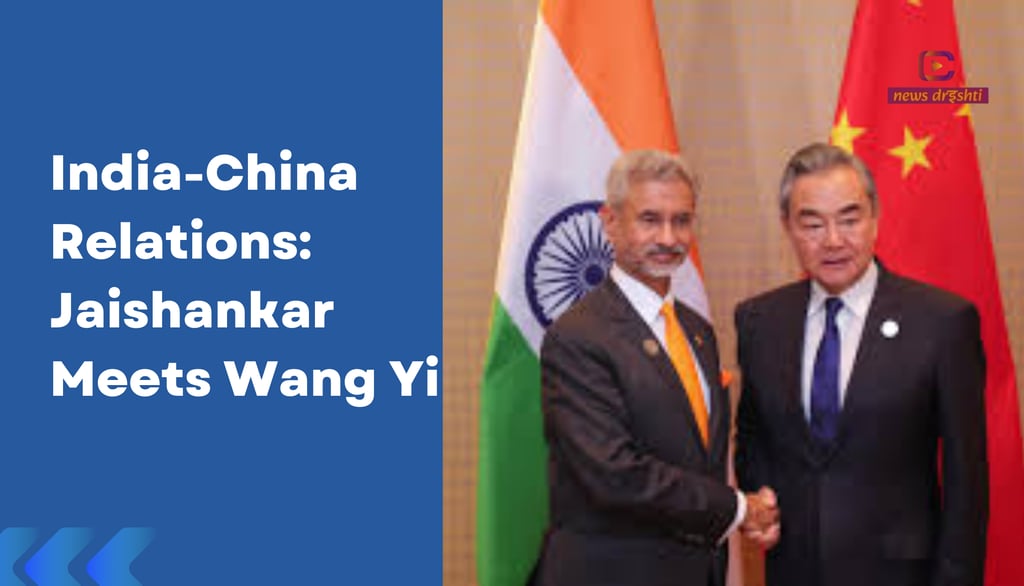India-China Relations: Jaishankar Meets Wang Yi
In a crucial meeting at the G20 summit in Rio de Janeiro, India's External Affairs Minister S. Jaishankar and Chinese Foreign Minister Wang Yi discussed the recent disengagement along the LAC in Ladakh and emphasized the need for sustained peace to enhance bilateral ties between India and China.
INTERNATIONAL


Introduction to Diplomatic Engagement
In a significant move towards enhancing bilateral relations, China’s Foreign Minister recently met his Indian counterpart, S. Jaishankar, during a diplomatic summit in Brazil. This meeting marks a pivotal moment in Sino-Indian relations, which have fluctuated over the years due to various geopolitical tensions. The discussions primarily revolved around multiple facets of economic cooperation, with a notable emphasis on the resumption of direct flights between the two nations.
The Importance of Direct Flights
Direct flights serve as a vital link between countries, facilitating both economic ties and cultural exchange. The reinstatement of these routes is critical for boosting tourism, enhancing business opportunities, and fostering greater people-to-people connections. During the meeting in Brazil, both ministers acknowledged the essential role that increased connectivity would play in rejuvenating the post-pandemic economic landscape of both China and India. By restoring direct flights, the two countries could witness a resurgence in bilateral trade and investment.
Broader Collaboration Beyond Aviation
The discussions in Brazil encompassed more than just aviation. The foreign ministers also explored avenues for collaboration in areas such as technology, climate change, and regional security. Considering the vast potential for cooperation in technology, both nations expressed a commitment to supporting initiatives in innovation. Additionally, the Foreign Minister of China reiterated the importance of pursuing joint efforts to address climate challenges, highlighting both nations' responsibilities towards global sustainability.
As India and China stand as two of the world's largest economies, their collaboration is essential not only for their mutual benefit but also for the economic stability of the Asia-Pacific region. Both foreign ministers recognized that overcoming minor disputes would require sustained dialogue and strategic partnerships.
Conclusion: A Path ForwNew Delhi, November 19, 2024 – In a pivotal diplomatic exchange, India’s External Affairs Minister S. Jaishankar met with Chinese Foreign Minister Wang Yi on the sidelines of the G20 Summit in Rio de Janeiro. The two leaders discussed progress on the recent disengagement along the Line of Actual Control (LAC) in Ladakh and explored steps to strengthen bilateral ties.
Jaishankar highlighted the importance of sustained peace in border areas, calling it essential for the normalization of relations. "We acknowledged the progress made in the recent disengagement in the India-China border areas and exchanged views on the next steps for our bilateral relationship," Jaishankar stated on X, formerly known as Twitter.
Wang Yi, a senior member of China’s Communist Party Politburo, stressed the need for "more mutual trust and less suspicion" in bilateral engagements. He advocated for enhanced cooperation in resuming direct flights, facilitating visa processes, and increasing journalist exchanges to foster better people-to-people ties.
Focus on Border Stability
The dialogue builds on recent agreements reached between Prime Minister Narendra Modi and Chinese President Xi Jinping during the BRICS Summit in Russia. Both leaders had instructed their foreign ministers to accelerate measures for resolving outstanding border issues.
The disengagement process in Ladakh, implemented over the past month, has been a positive step toward de-escalating military tensions that have persisted since 2020. "I’m glad to note that on the ground, the implementation of that understanding has proceeded as planned," Jaishankar remarked, referring to agreements finalized in earlier high-level meetings.
Resumption of Direct Flights
One of the key topics of discussion was the resumption of direct flights between the two nations, suspended since the onset of the COVID-19 pandemic and exacerbated by diplomatic strains. Restoring air connectivity, Wang Yi emphasized, would not only boost economic interactions but also rebuild cultural and social bridges between the neighboring nations.
Business communities on both sides have long advocated for direct flights, citing their critical role in facilitating trade and investment. "The resumption of flights will be a strong signal of intent from both nations to rebuild trust and cooperation," said an official involved in the discussions.
Global Implications
Apart from bilateral issues, the ministers also deliberated on the global geopolitical landscape, with both sides agreeing to maintain open channels of communication to address mutual concerns.
As the two Asian giants navigate complex bilateral challenges, the emphasis on actionable steps like border stability and improved connectivity indicates a cautious but constructive approach to rebuilding trust. Whether these measures translate into broader reconciliation remains to be seen, but the meeting in Brazil marks a step forward in easing tensions and fostering dialogue.ard
The meeting in Brazil signifies a renewed focus on diplomacy as a tool for resolving differences and promoting mutual interests. As China’s Foreign Minister and Jaishankar pave the way for a constructive relationship, the resumption of direct flights represents just a start. With ongoing dialogues and tangible commitments, both countries have the opportunity to strengthen their partnership. The world is watching closely as India and China work towards realizing their full potential, heralding a new era characterized by collaboration and progress.
